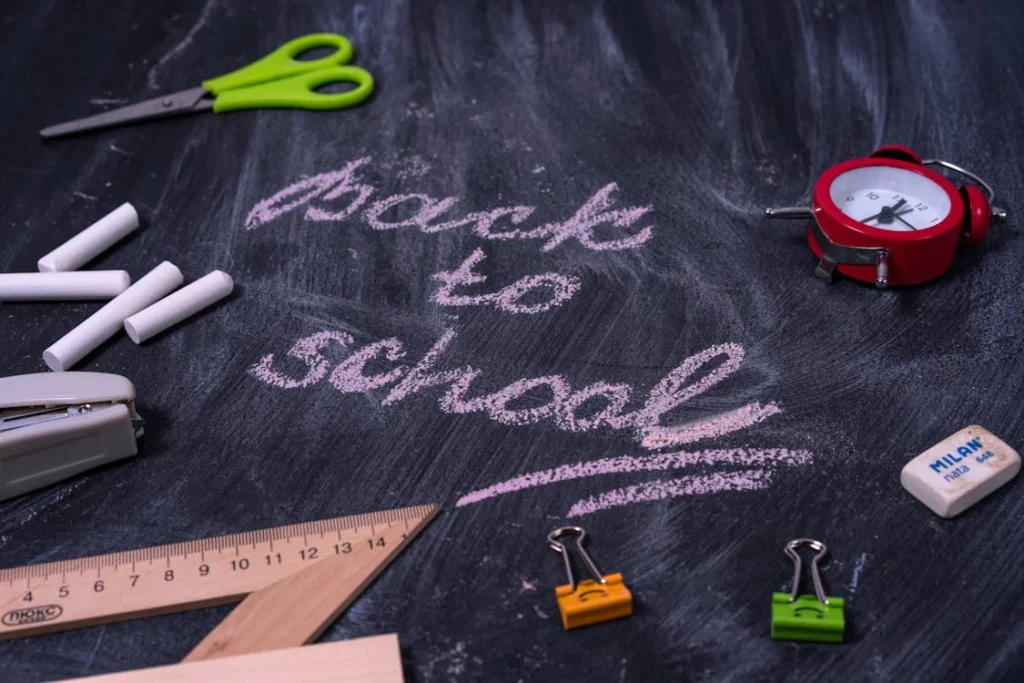
Parents often celebrate the idea of their kids going back to school, but in the thick of getting back into a routine, drama can ensue making what could be a fun and exciting time turn stressful. With a little preparation and pre-framing, the adjustment of going back to school can be a smooth process for both you and your child(ren).
First Day Nerves are different for each child; however, some concerns are universal. Here are some ideas and reminders for you and your family:
Elementary School-Aged Children:
-
Begin adhering to an anticipated bedtime and wake-up routine several days before the start of school. Routines take the guesswork out “what to do” and often reduce stress when children are tired or have other things on their minds. Remember: routines are something that has to be practiced. Fun diagrams your child can draw up themselves, graphs, and stickers can be an easy way to remember what to do before bed or in the morning. It also gives them some responsibility and perceived control.
-
Go to any orientations or meet-the-teacher opportunities. Elementary schools typically hold an orientation that helps students become familiar with their teachers, classmates, and the classroom setting and schedule. This is a great way to “break the ice.”
Middle School-Aged Children:
-
Discuss a schedule, allowing your middle schooler to achieve agency. Helping your middle schooler get back into a routine is not much different than getting your elementary school kid prepared, but middle schoolers should start working toward independence. Encourage them to make a list of things they need to do before bed and in the morning.
-
Redirect to provide guidance. How you get your middle schooler to accept your ideas is important. Instead of telling them what they should do, rephrase their own ideas, and ask questions. This will give your child the new independence they often crave and should be working toward. For example, “Do you think getting your clothes ready the night before will make your morning easier?” will often work much better than “You need to get your clothes out the night before.”
-
Go to orientation or schedule a tour. Orientations at this age are still beneficial, especially if your child is attending middle school for the first time. Reach out to a friend and attend orientation at the same time; it can also be a great way to get your child excited about going back to school and help to put them at ease.
High School Aged Children:
-
Acknowledge the sleep difference. Remember, high schoolers are on a different circadian rhythm than the rest of us. Typical sleep hours don’t mesh with the teenage needs: bedtime before 11 pm is often a physical and mental struggle. Also, teens tend to need more sleep than they are willing to admit. According to Michael Crocetti, a Johns Hopkins pediatrician, teens need 9-9 ½ hours of sleep which is an hour more than 10 year olds!
-
Plant some ideas about getting prepared ahead of time but let the teenager be in control. Don’t forget they benefit greatly from making mistakes, so although it’s difficult, allow them to “fail.” In any aftermath, be supportive and help them evaluate what went wrong, what might work better, and let them know you are proud of them for problem-solving. Give them a soft place to land and recover from any errors. High school-age children often feel critiqued, not supported, which can lead to mistrust between a parent and child. Their feeling criticized may not be justified, but teens are still working on how to interpret relationships, and you want to keep the doors to parent/child dialogue open allowing your relationship to flourish. Distrust, on the other hand, can make it hard for high schoolers to ask for help when they really need it.
-
Be the parent/guardian. While your teenager may seem confident and independent, they still need you as the parent. They want and respect boundaries, so don’t fall into being a friend. Friendly, but not friends. This can be difficult, however, remember that they can have multitudes of friends over the course of their lifetime, but your job is unique, and your relationship is special.
-
Again, go to orientation. If your child is attending high school for the first time, it is especially important to attend orientation. Even better if they can go with a friend–in addition to their parents. Even if they request that you wait in the car!
About the author: Brad Fantle is the owner and chief instructor of Tiger Rock Martial Arts of Tallahassee, where he has empowered students of all ages to cultivate confidence, focus, and resilience since 1999. A longtime Tallahassee resident and community volunteer, Brad partners with local schools and youth organizations to promote healthy lifestyles and character development, offering complimentary summer training sessions for educators and scholarship programs for deserving students. His decades of experience coaching young people—both on the training mat and in classroom enrichment programs—inform the practical, positive strategies toward wellness and health. For more information, contact Brad Fantle at: 850-878-3900 or bradfantle@gmail.com , www.tallytkd.com

